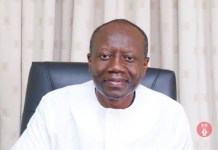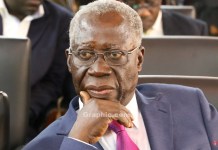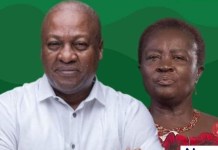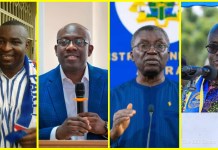The President on Sunday evening gave an update on national efforts to stem the spread of the coronavirus in Ghana, the eighth of such exercise since March.
Nana Akufo-Addo said in the televised address that he took many of the decisions after a meeting with the Council of State and other key stakeholders.
We present below eight poignant points from this eighth update.
1- Extension of the ban on public gatherings
Nana Akufo-Addo extended a two-week ban on public and social gatherings, including funerals and religious activities, by two more weeks.
He said the decision to lift the lockdown imposed on some parts of the country but ban social gathering is supported by data.
“I have, accordingly, by Executive Instrument, extended for another two (2) weeks the suspension of all public and social gatherings, as set out in E.I 64 of 15th March, 2020, effective tomorrow, 1am, Monday, 27th April,” he announced.
2 – Construction of 100-bed hospitals in selected districts across the country
The President acknowledged during the address that the pandemic has exposed wide gaps in Ghana’s health infrastructure and therefore announced a plan to begin constructing hospitals in some 88 districts in the country without hospitals.
He believes the hospitals will be among the lasting legacies of the pandemic in Ghana. The government, said is committed to making a major investment in Ghana’s healthcare infrastructure – touted his plan as the largest in Ghana’s history.
“We will, this year, begin constructing 88 hospitals in the districts without hospitals. It will mean ten in Ashanti, nine in Volta, nine in Central, eight in Eastern, seven in Greater Accra, seven in Upper East, five in Northern, five in Oti, five in Upper West, five in Bono, four in Western North, four in Western, three in Ahafo, three in Savannah, two in Bono East and two in North-Easter regions. Each of them, will be a quality, standard design 100-bed hospital with accommodation for doctors, nurses and other health workers and the intention is to complete them within a year,” the President said.
3 – Muslims must stay at home
The President also appealed to Muslims to stay home during the Ramadan period, doing this through what he calls “analogical deduction.”
The breaking of the Ramadan fast is an intensely social activity in Muslim communities, however, in line with the ban on social gatherings, the President has appealed to them to shelve mass social gatherings that hold the potential of spreading the virus.
“Muslim scholars agree that ‘rain’ represented danger, and, therefore, the prescription for Muslims to stay at home and pray in times of heavy rain is applicable to all life-threatening situations. I, thus, call on all Muslims to heed this prophetic admonishment to pray at home, so we can protect ourselves from the danger of Covid-19. This is in line with the counsel of the wise, devout Muslim scholar, the Chief Imam, Sheikh Dr. Osman Nuhu Sharubutu. I wish all Muslims Ramadan Mubarak,” he said.
4 – Ghanaians must stop helping foreigners to cross illegally into the country
The President also revealed that some unpatriotic Ghanaians are assisting some foreign nationals from neighbouring states to cross illegally into the country following the closure of borders.
He said even more unfortunate is fact that several of the West Africans, who have been arrested for crossing into Ghana illegally, have later tested positive for the virus.
“These are unpatriotic acts, and must stop. We cannot continue to allow a few persons, who are motivated by their own selfish, money-making interests, to endanger the lives of the rest of the population. Not only will persons who enter our country illegally be strictly dealt with, but so will Ghanaians who facilitate their entry. As I have said before, being a Ghanaian must mean that we look out for each other,” the President admonished.
5 – Wearing of facemasks made compulsory
The President today confirmed what a section of the public saw coming: the wearing of facemasks is now compulsory.
He said as of Saturday, April 25, 2020 the Health Minister, Kwaku Agyemang Manu, to issued directives to guide the production and mandatory wearing of face masks.
“We should all familiarise ourselves with them, and apply them, as the Regional Co-ordinating Councils of the Greater Accra, Ashanti and Central Regions are demanding of their residents,” he said.
6 – Rare public appreciation of Melcom, Shoprite and Palace Supermarkets
In a rare move, the President singled out top supermarkets in Ghana for enforcing social distancing protocols, the use of hand sanitizers and the wearing of masks for all patrons and staff.
“I want to signal out supermarkets such as Melcom, Palace and Shoprite, in particular, for the excellent discipline they are maintaining in their enterprises across the country, and call upon all other enterprises, especially our market women, to emulate them. The example of markets in the Sekondi-Takoradi Metropolis, where social distancing is being well observed, is an excellent one for market women all over the country,” he said.
7 – Ghana still in uncharted territory
Despite the progress being made to hold the spread of the coronavirus, Ghana still remains in uncharged territory, the President said.
“Clearly, we still have some way to go towards ridding ourselves of the virus. The truth is that this will be a long war, broken up into several battles,” the President announced.
Ghana’s case count, as at Sunday, April 26, 2020 stands at 1,550 with 10 deaths and 11 deaths and 155 recoveries.
8 – Health workers are getting adequate supply of protective equipment
The President gave an update on the efforts to keep frontline health workers incentivised when he announced that in addition to some relief packages given to all health workers, Government has enabled domestic production and supply of protective equipment to health workers to increase significantly.
“They have received, in recent days, nine hundred and five thousand, and thirty-one (905,031) nose masks, thirty one thousand, six hundred and thirty (31,630) medical scrubs, thirty one thousand, four hundred and seventy-two (31,472) gowns, forty six thousand, eight hundred and seventy (46,870) head covers, and eighty three thousand, five hundred (83,500) N-95 face masks,” he said.











